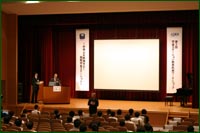 |

As I have mentioned, recent tendencies show that society increasingly requires space education, and we, the people directly involved in the space field, need to further strengthen this link with society. Educational activities in JAXA have been entrusted to a very limited number of employees and the connections of individuals, but society's needs go beyond these limited efforts. Apart from the respective unique educational programs of the three former aerospace related organizations (NASDA, ISAS, and NAL) that were merged, JAXA should also aim to enhance future activities such as establishing its own curriculum and developing teaching materials. To achieve this goal, we urgently need to set up something like an education center that consists of full-time office clerks, researchers, classroom educators, and government administrators in charge of education who are all enthusiastic about education and space development. We then need to augment the center and continue its activities systematically in cooperation with related domestic academic societies. In the future, we can expand our activities further to help space education in other Asian countries within the framework of the Asia-Pacific Regional Space Agency Forum.

 I have expressed my personal opinion about the state of Japanese space education because of my deep regrets as a person involved in the space field for over 30 years that we should have started space education when we first established a space organization. I think that Japanese people are still at a level of recognizing space merely as a "romantic" world. Their knowledge about space and understanding of the importance of space development are far from something that would influence national space policy. I am swayed by misgivings that our space development will lag behind other countries, even Asian countries, if we do not do anything to improve the current level of space education. Based on my strong belief that there is no future national development for Japan without engaging in space, I think we should commence all-out efforts to enhance educational activities to deepen Japanese people's understanding about the importance of space development with a fresh mind as though we had just begun space development. The most urgent mission is to cultivate social leaders who understand the importance of space. I have expressed my personal opinion about the state of Japanese space education because of my deep regrets as a person involved in the space field for over 30 years that we should have started space education when we first established a space organization. I think that Japanese people are still at a level of recognizing space merely as a "romantic" world. Their knowledge about space and understanding of the importance of space development are far from something that would influence national space policy. I am swayed by misgivings that our space development will lag behind other countries, even Asian countries, if we do not do anything to improve the current level of space education. Based on my strong belief that there is no future national development for Japan without engaging in space, I think we should commence all-out efforts to enhance educational activities to deepen Japanese people's understanding about the importance of space development with a fresh mind as though we had just begun space development. The most urgent mission is to cultivate social leaders who understand the importance of space.
Photo
The second International Space Station (ISS) educational use workshop held at Chiba University (on August 8, 2004)
|
 |
6/6 |
 |
|
 |